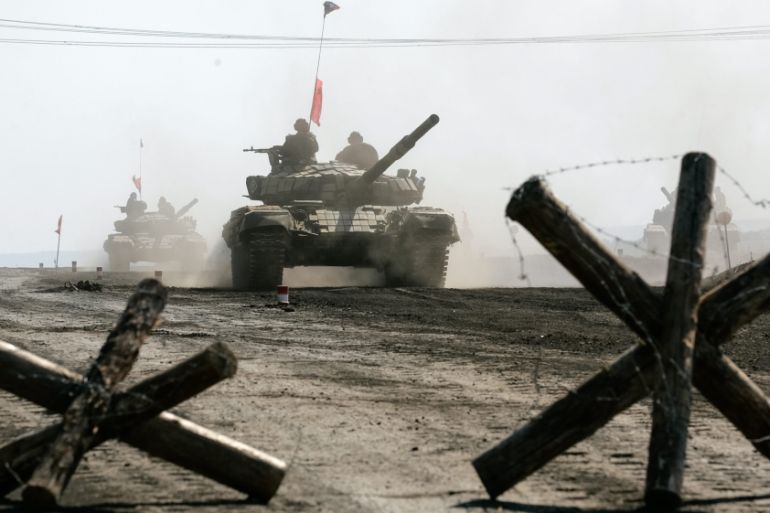Ukraine’s warring sides begin pullback of weapons
Ukraine’s army and rebels start withdrawing weapons 15km from line of engagement, in accordance with Paris agreement.

Ukrainian army and pro-Russian rebels have begun pulling back weapons from a buffer zone in eastern Ukraine following a fresh agreement in Paris.
Vladyslav Seleznyov, an official representative of Ukrainian forces, said on Saturday that the army started listing the weapons of less than 100mm calibre and coordinating the process with the Organization for Security and Co-operation in Europe (OSCE).
“Now the process of making the list and coordinating with OSCE is going on for withdrawal of weapons of less than 100mm,” Seleznyov told Russian news agency Itar-Tass.
Meanwhile, the Luhansk People’s Republic group, pro-Russian separatists in rebel-held east Ukrainian region of Luhansk, said that they had begun withdrawing their tanks from the buffer zone.
“We are starting to withdraw weapons. Tanks are going to be withdrawn first,” the group said on Saturday at their headquarters, according to Interfax news agency.
“The first convoy of tanks have already started to back up from the area of Aleksandrovsk village, and they will be taken 15km away from the line of engagement.”
RELATED: Holding the line in eastern Ukraine
The development came a day after a Paris summit where the leaders of Ukraine, Russia, France and Germany agreed to withdraw tanks, as well as light weapons from the buffer zone.
The process is scheduled to take 41 days and is in line with a Western-backed peace deal agreed in the Belarussian capital Minsk in February.
The leaders also agreed to delay rival local elections planned by Kiev and the rebels until 2016 – a major sticking point in Minsk agreement.
The rebel-held Donetsk region was due to hold the vote on October 18, Luhansk region on November 1, and the government-controlled territories on October 25.

Kiev wants the separatist elections to be cancelled. Ukrainian President Petro Poroshenko has previously said that the vote organised by the rebels would be a “red line” that Kiev could not accept.
German Chancellor Angela Merkel said after the Paris summit that Russian President Vladimir Putin, who is accused of controlling the rebels, had “committed to working towards … establishing the conditions that would allow elections to take place according to Minsk, based on Ukrainian law, in a coordinated fashion between the separatists in Donetsk and Luhansk and the Ukrainian government”.
The foreign ministers of Russia, Ukraine, France and Germany are expected to meet in November to discuss the progress of the agreement.
The conflict between the Ukrainian government forces and the pro-Russian rebels has claimed more than 8,000 lives since April 2014, according to the United Nations.
Over the past few weeks, fighting has all but stopped in east Ukraine and peace appears closer than ever.
Ukraine and the West accuse Russia of covertly supporting the rebels with troops and weapons, a claim Moscow denies.